Our first year homeschooling experience was not something I planned to write about, but I had so many thoughts that felt necessary to document.
Maybe I’m detailing this, in a way, to explain to my curious friends and critics who don’t understand why anyone would ever want to homeschool their child.
I can imagine, though, I’ll need to look back on this first year to remind myself of why I chose homeschooling.
Because honestly, our first year was great. It wasn’t easy, but it was great, and it was more than worth it.
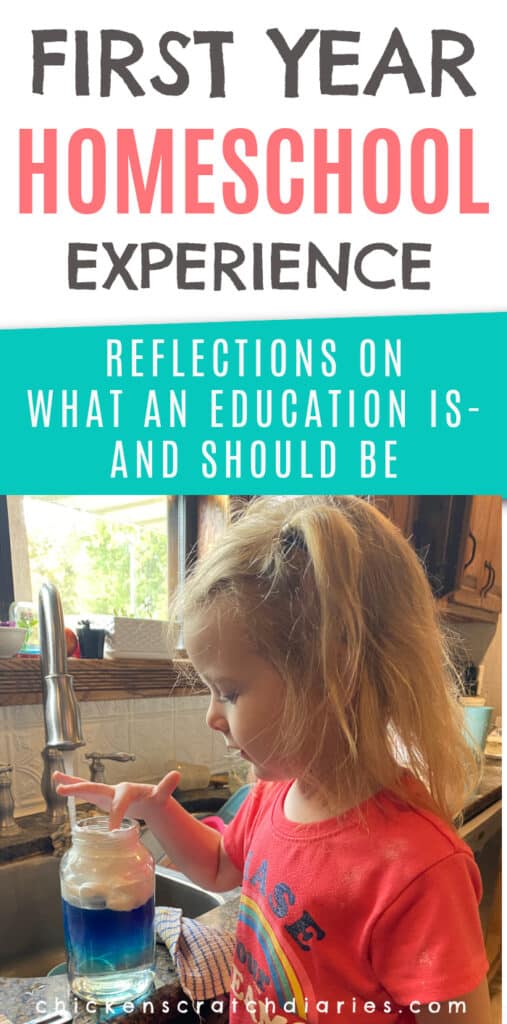
I also know that it’s easy to romanticize a new ideal or experience.
And so again, documentation might be helpful to encourage my future self, when the inevitable big challenges arise and time and the hard days take a toll on us all.
Homeschooling tips? Advice? I think not.
Before I dive in here, I have to humbly remind myself (and you) that I am new at this and totally not qualified to give any first year homeschooling tips or really any education advice in general.
In fact, at the end of our first year and I’m more amazed at what I don’t know. And what I forgot! (Hello, 2nd grade math; we should get acquainted again.)
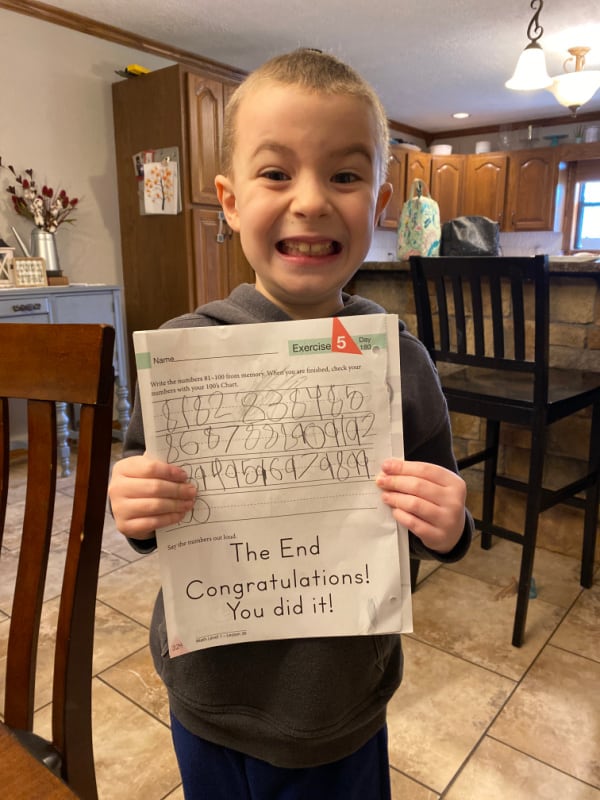
I can only share our first-year experience – and then probably come back and cringe at this post in a few years.
I certainly can’t tell you whether homeschooling is a good decision for you. Each family and child is as unique as a fingerprint, and that must be considered.
Our very uniqueness frees us to be thankful for the many options we have, and to know that (I believe) a child can thrive anywhere we plant him, with God’s help and guidance.
This post likely contains affiliate links. Please see our disclosure for more info.
What is an education?
This question was a logical starting point that began our homeschooling journey.
My whole view of what an education is, and should be, has changed drastically over the last several years.
This year it was expanded even more by actually experiencing different modes of learning, and through the wisdom of veteran moms who have gone before me (and have less grey hair than I pictured).
I used to think education was something that fit into a neat little package of state-developed curriculum doled out 7 hours per day with standards, schedules and the oh-so-coveted “socialization” aspect.
(More on that later.)
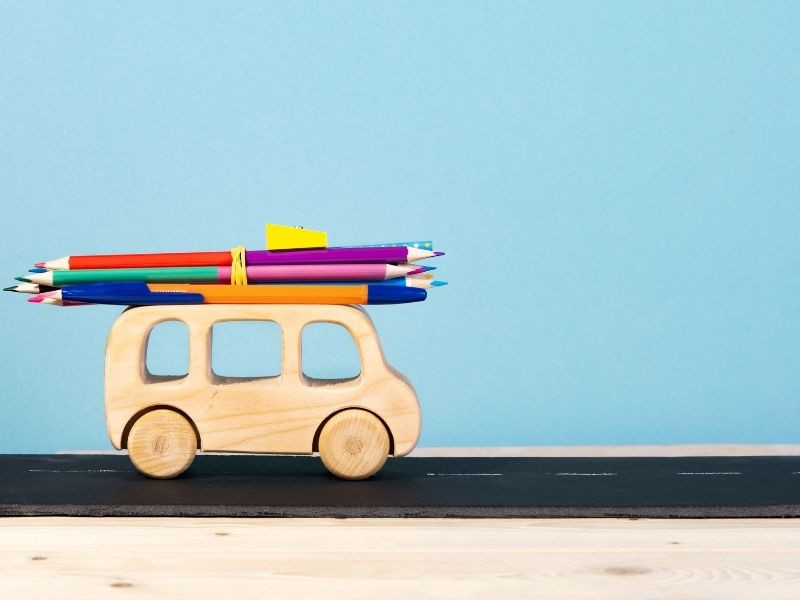
I was convinced that learning needed to be facilitated by trained teachers (still a good thing), in a classroom setting, and that I could never do what they do.
And while some of that is true (I would stink at classroom management) I found out this year that education – a real, valuable education – can also happen at home, with just one or a few students, around a kitchen table (among other places).
How do we define what education should be?
I think this is something we have to reverse-engineer by asking, what do we want the result of education to look like?
To learn something just to learn it is not useless in itself, but it also might not be the most useful.
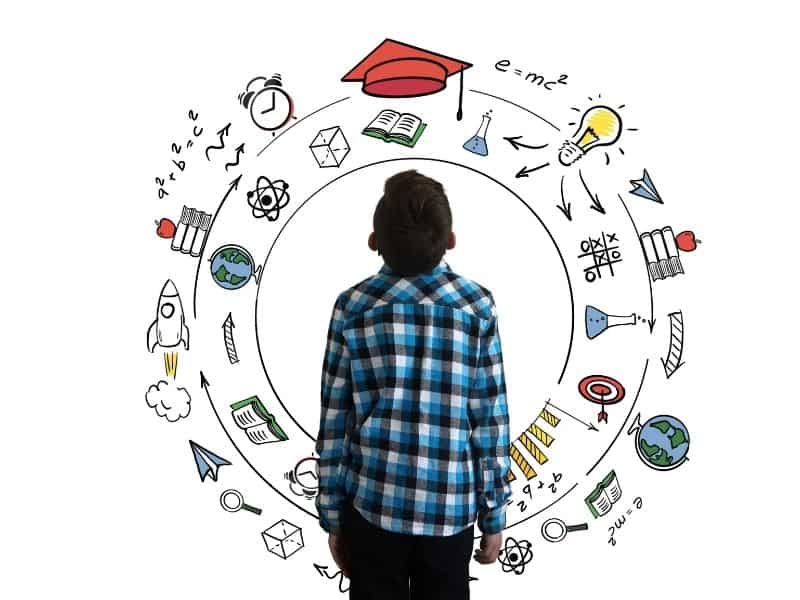
I think what I’ve learned over this year is that a useful education is one that you can apply not only in the future, but today.
If the goal of formal learning is only gearing kids toward future employment or college, it would be more simple.
But my real hope, when I look back on this year, is that my kids will always love learning as much as they did this year.
If we accomplish that, their education will never end, nor their possibilities.
Oh, the places you’ll…stay
Formal learning at home seems too sheltered and maybe too familiar for parents like me who have been brought up through the public school system.
I can now say without a doubt that I’m amazed what a child can firmly and quickly grasp in a familiar environment, without the social pressures that make public school anxiety-inducing for so many kids.
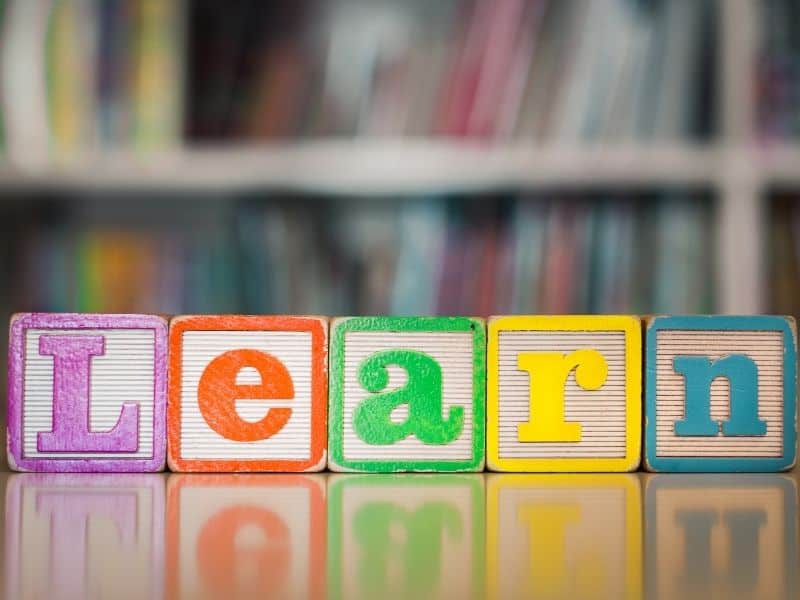
I was one of those kids who didn’t mind school in itself…but the social aspect was another story.
Though at one time it was the norm in society, to be at home is a special and rare thing for kids today.
My hunch is that more time at home can not only build stronger family bonds, but also confidence in their place in the world — in their own time and in their own way.
About that socialization thing
Every parent who even thinks about homeschooling for three seconds out loud will be asked intently, “But how will they be socialized??” by literally every well-meaning friend and family member within earshot.
The best explanation I heard quite some years ago – and this probably was the start of my homeschooling curiosity – was that there is a difference between being socialized and being sociable.
The former is honestly not that desirable and the latter is really optimal.
Do I want my kids to just act like every other kid the same age that they’re surrounded by? Does that really benefit them in the long run?
Or, do I want them to be able to interact with (and appreciate) people of all ages, young and old and in between?
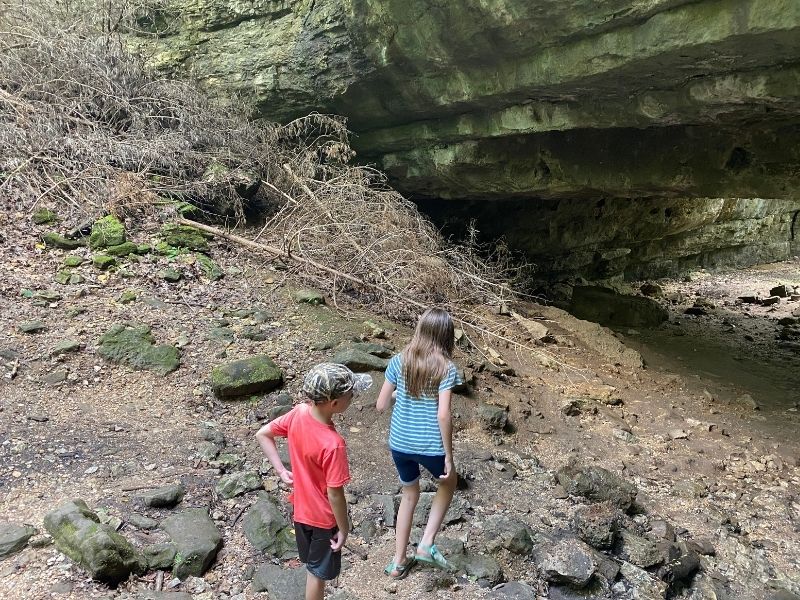
From this perspective, homeschooling provides more opportunities for a wider range of social experiences. Because even though we’re learning at home…we’re certainly not limited to the home!
This is one of my favorite things about homeschooling so far – getting to create our own agenda and deciding what we want to experience, and with whom.
The people we meet along the way are part of this education that extends far beyond these four walls.
First year goals
A veteran homeschool mom asked me what my goal was when I was beginning this journey last summer. At first it was a broad and terrifying question.
Beyond the goal of a love of learning, the first thing that came to mind was, “I want to them to read and love good books; not the crap at the Scholastic Book Fair.” (Harsh, I know!)
Books, like words, matter
I should mention here that our oldest two kids are still in public school (for now), and we are at peace with that decision. But ouch, those book fairs have made me depressed for years.
It seems the push has been to encourage kids to read whatever they want to read, for the sake of reading.
And in my opinion, today’s publishers have made it easy for them to ignore great books, with real words and a plot line.
Yes, gateway books can be a fantastic tool when a child is not loving reading at all. But why not feed the mind good food from the start?
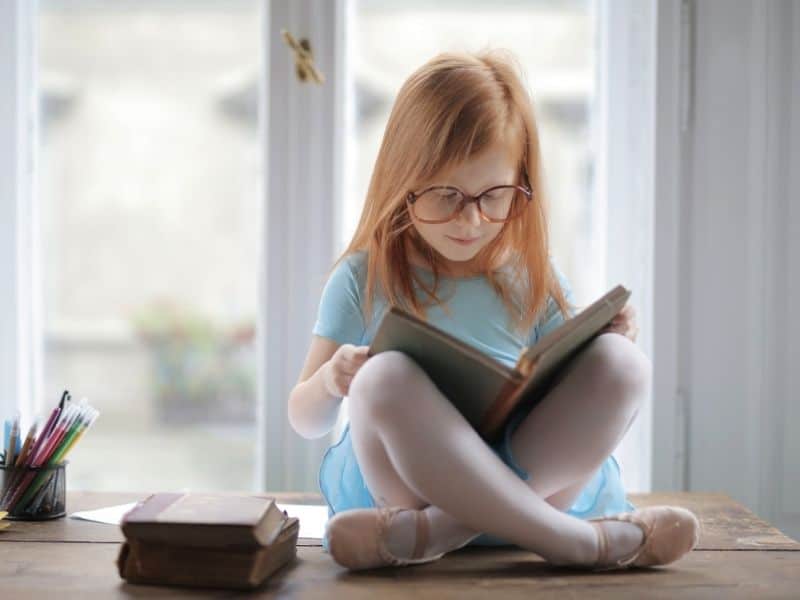
We start babies on green beans and not marshmallows for their first solid foods; why would we feed them fluffy books with no substance as their main course?
As if there is no difference between the latest regurgitated Disney-movie-turned-book, and actual literature?
(End rant.)
But really… where have all the bookshelves gone?
Walking through a large Big Box store recently, I noted with dismay that bookshelves have been replaced by TV consoles, for the most part.
In my hunt for a new piece of furniture to hold our growing book collection, everything I found seemed to be more decorative – capable of holding a mini cactus and a picture frame, not sturdy hardback books.
Ladder bookshelves; shelves with no ends to contain hefty volumes…these imposter bookcases were a sad thing to me, and a sad thing for raising future readers and thinkers.
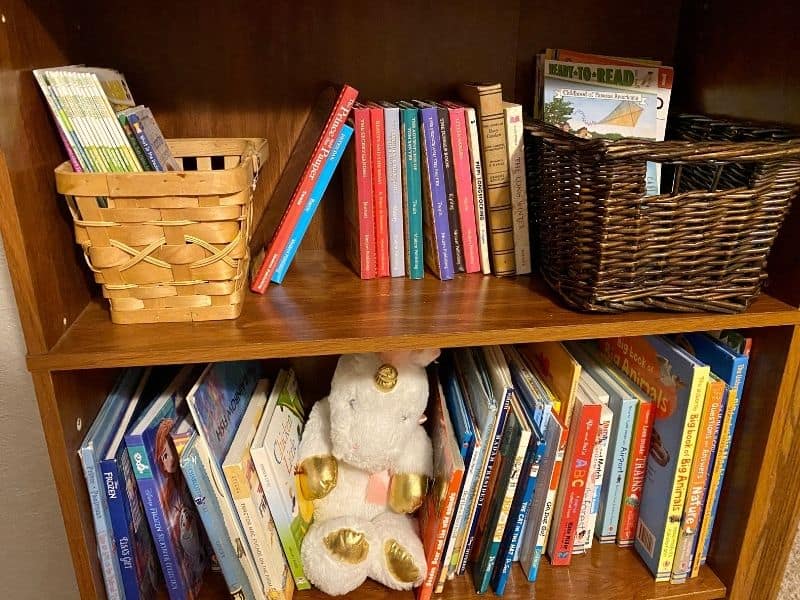
What I want to remember about our first year homeschooling
While good books and solid-wood-bookcases may not save the world in reality- the lack of them is certainly a sign of the times.
So this is just one reason I want to look back at this year and remember choosing good books, and even not-so-good books.
I want to remember the layers of the ocean we created in a mason jar, the three of us, and the counting beans and timeless hymn studies.
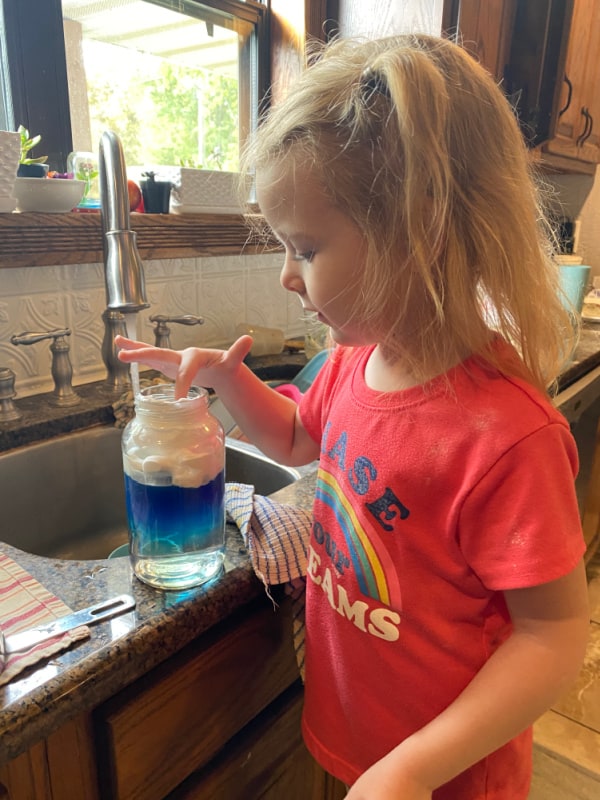
I want to remember how we found ourselves surrounded by the beauty of the Secret Garden and vowed to create our own version someday.
I want to remember that we held back tears at the end of Swiss Family Robinson, when Fritz and Francis left the island.
Even more, I hope to remember how we learned that there is a joy in imagination that a screen can not match.
And that I was here to witness it.
Choosing our own adventure
But I digress. You see, it’s not just about the books, this homeschooling adventure (though they were some of my best childhood friends.) Nor is it all about the nature walks and the science experiments.
It’s about thinking.
Great thinking begins with truth and goodness and great ideas.
Great thinking also comes from evaluating bad ideas, untruths and wickedness (all in due time).

What seems to be most invaluable is that I now have a say in when, where and how these concepts are introduced to my kids, and in what context.
This is how values are formed, after all — the values they will take with them into the rest of their lives, which will continue to be shaped by the span of years and maturity and experience.
The values that will, I pray, mold them into competent adults with well-honed critical thinking skills.
So maybe this is the best part I’ve discovered so far about homeschooling, is the choosing.
My parents made different choices before me when it came to formal education; we’re making different choices with each of our four children.
There’s no debating that good teachers have impacted my life in countless positive ways; they helped me to love learning, so that I could in turn raise eager learners myself.
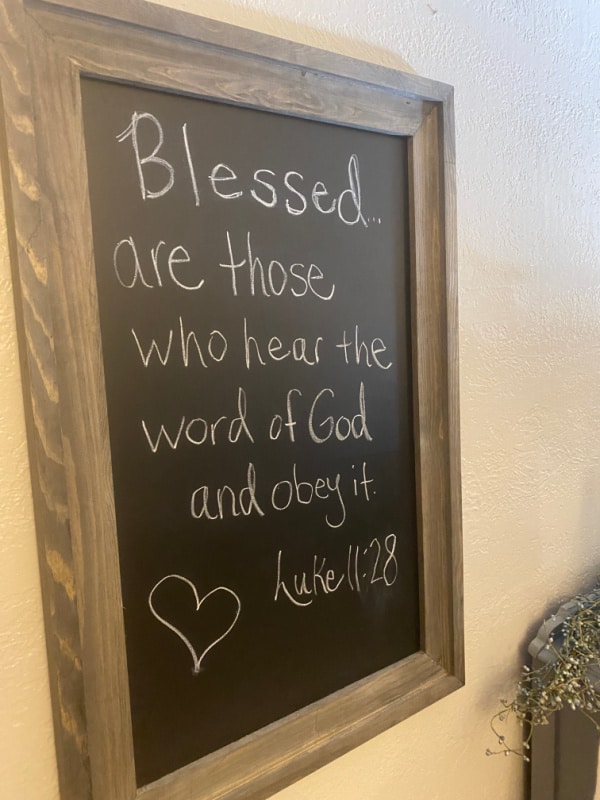
God willing, I hope to bring up these last few pupils under our own roof (and the sky, and the library roof), and continue choosing alongside them.
The view from the kitchen table, after all, is pretty spectacular.
Update: Are we still homeschooling?
Yes, we are! In a few short months, we’ll be starting our 5th year of homeschooling.
And no, I don’t have any more advice than when I started. Well, not really…
But maybe that will come up in another post, eventually. 😉
You might also like:
Raising country kids: The beauty of rural life